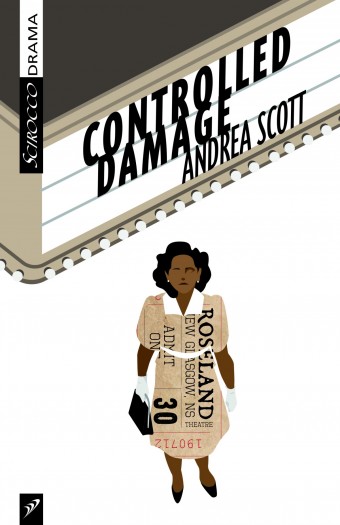Viola Desmond made history in 1946 when she refused to leave a whites-only area of the Roseland Theatre, a movie house in New Glasgow, Nova Scotia. She was then convicted of a minor tax violation for the one-cent tax difference between the seat she paid for and the more expensive seat she used.

- Controlled Damage
- Andrea Scott
- J. Gordon Shillingford Publishing
- $15.95 pb, 104 pages
- ISBN: 978-1-927922-3-7
Desmond’s confrontation of racial segregation and discrimination was a catalyst for the modern civil rights movement in Canada.
“We owe her a debt of gratitude,” says Toronto playwright and screenwriter Andrea Scott, whose play Controlled Damage explores Desmond’s life and act of bravery. “A lot of the freedoms we take for granted are the result of her standing up for herself and speaking truth to power.”
The play was originally to be written for children. However, like many literary plans, things went in another direction.
“After many years, drafts, and theatre residencies,” says Scott, “Controlled Damage transitioned into an adult two-act play with 23 characters played by 10 actors in a story that spanned four decades.”
The world premiere of the play was by Neptune Theatre in Halifax in February of 2020, where it sold out before opening night. However, Controlled Damage was set to be published even before the production was secured. A lunch meeting with her publisher about a piece in a collection of plays led to a mention of Controlled Damage.
“She asked about the play, and as I described one scene I’d recently finished, her eyes welled with tears and she said, ‘I think we’ll want to publish that play. That sounds so beautiful,’” Scott explains.
“It felt amazing and validating to have Scirocco Drama believe in the potential and beauty of my work.”

The play’s title has multiple meanings. “I’ve had people slip and call it Damage Control and I kind of love that mistake,” Scott says. “Controlled damage is the process by which the natural, strong fibres of Afro-Canadian hair are broken down with chemicals in order to make it soft and easy to manage. To me that is a perfect analogy of what Canada tried to do to Viola Desmond in 1946 – break down her natural strength and resistance to conformity.”
Scott hopes people experiencing her play “understand that activism can be a simple act of quiet resistance to inequality,” she says. “What I hope readers/audiences take away from the play is the complicated history of racial injustice in our country, where the voices of the marginalized are silenced by not acknowledging the racism that has kept Black, Indigenous, and people of colour from reaching their best potential.”
And today, with Black Lives Matter protests against the continued oppression of systemic racism gaining momentum, Scott adds, “Controlled Damage should remind us all not to be complacent about our rights and freedoms again. Being sweet, kind, and smiling is no longer enough to be treated with fairness.
“The control we thought we had may have been an illusion, and now it’s time to stand up, straighten our spine, and fight. Control is never given willingly, it must be taken. I hope everyone sees/reads this play and knows that their voice has more power than they think.”













